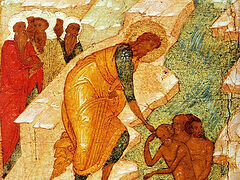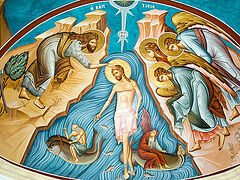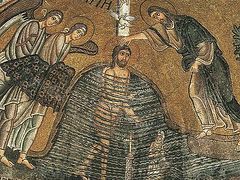In the name of the Father, the Son, and the Holy Spirit.
Today is the marvelously bright and joyful feast of the Baptism of the Lord! We recall our own baptisms. We gave vows, heartfelt promises to God either as a adults or as infants, through our parents and godparents who answered for us before God, that we will fulfill His Commandments; that we will strive to keep our consciences good. The apostle Peter said, The like figure whereunto even baptism doth also now save us (not the putting away of the filth of the flesh, but the answer of a good conscience toward God,) by the resurrection of Jesus Christ (1 Pet. 3:21).
Yesterday, as I prepared for this sermon, I discovered the remarkable words of St. John Chrysostom—better words cannot be uttered. Over 1500 years have passed since this fifth century ascetic lived. What fresh, wise, amazingly modern words! His teachings are at times harsh, but directed straight at the heart of the Christian. Before the invention of television and film, before there was even fictional literature, our ancestors read the most complicated theological texts of Sts. Gregory, Basil, and John Chrysostom. There was a separate book, which was called, Chrysostom.
St. John Chrysostom writes in his “Discourses on the Epistles to the Romans” about words of the apostle Paul in his Epistle to the Romans: Therefore we are buried with him by baptism into death: that like as Christ was raised up from the dead by the glory of the Father, even so we also should walk in newness of life (Rom. 6:4). What do these words mean? Partaking of the Lord’s Baptism by having our own baptism, we fully immerse ourselves in the Life of our Lord Jesus Christ. Baptism means in translation, “immersion in water”. Immersion in the Spirit of Christ, in His Life! We immerse ourselves also into His teaching, as well as His suffering and burial along with Him—out of our love for Him; because we have finally found the most beautiful and perfect being in this world and want to unite with Him in everything! We are spiritually buried with Him in His sufferings for the human race and for us ourselves, for righteousness and truth, for eternity, for the destruction of evil and sin! We are ready for this even before His death and burial, and before our own death and burial. And both our lives and our deaths are dedicated to the God-man, Whom we have found.
If we in sufferings, in death, in teachings, and in life strive to be like Him, then even more, says the apostle Paul, shall we participate in the resurrection and eternal life. All that is His we accept as an inheritance, as the best and most desired of all human possibilities. St. John Chrysostom writes, “But (the apostle) for now leaves his listeners to ponder this according to their own reasoning, while he, in expectation of the future resurrection, requires from us a different resurrection—namely a new life consisting in a change in the manners of our present life. When the fornicator becomes chaste, the greedy man becomes merciful, or the cruel becomes meek, then in this consists the resurrection that serves as the beginning of the future resurrection.” This is the precursor of the resurrection of our souls in the renewal of a person who lives according to Christ’s Commandments; this is the beginning of our future resurrection. St. John Chrysostom goes on, “In what sense is this a resurrection? In the sense that sin is put to death, while righteousness has resurrected; the old life has passed away, and a new, evangelical life has begun. And every time you hear of new life, understand it as great change and transformation.” St. John Chrysostom says to his own contemporaries and to us as well: “But I am left to weep and sigh heavily when I imagine on the one hand, what great love of wisdom St. Paul demands of us, and on the other hand, what carelessness we have fallen into, returning after Baptism to our former old age, turning back to the slavery of Egypt.” Addressing his contemporaries who received Baptism as adults, St. John Chrysostom says, “In ten or twelve days after receiving Baptism, we have already reverted back and taken up our former affairs.” But we, unfortunately, after yet another baptism (repentance—the holy fathers call it a new baptism), cleanse our sins by our repentance and then again go back to our former deeds. St. John Chrysostom writes: “The Apostle Paul requires of us good behavior not for a certain number of days, but for our whole lives. But we return to our former vomit, even after the youth we’ve received by grace, preparing for ourselves our former old age from sin.” Regardless of age, a person after baptism, after repentance—which is also a baptism—returns to a youthfulness of soul. But when he betrays this youthfulness and strength, returns to his oldness, then he makes his soul old again! St. John Chrysostom writes, “For love of money, servility to vile passions, and all sin in general usually ages those who commit them, and brings the aged closer to destruction. It is impossible, truly impossible to see that the body wastes from time like the soul is corrupted and weakened by a multitude of sins. It becomes completely suitable for the devil. Such are the souls of sinners. But not so the souls of the righteous—they are young and hale, and ever abide in the prime of life, always ready for any struggle and battle.”
Let us remember Fr. John (Krestiankin). What a youthful man he was! And Fr. Adrian (Kirsanov)?! Or Fr. Nicholai Guryanov?! They were truly youthful. When we were celebrating Fr. John’s ninetieth birthday, he and I were left alone and he said, “I’m ninety years old. I’m all covered with wrinkles, I’m old. But in my soul I’m twenty-two!” He knew his age exactly! He was what St. John Chrysostom calls us to be. “The souls of sinners, when undergoing some small attack, usually fall right then and there and perish. The prophet [David] expressed this when he said that they are like dust that the wind hurls away from the face of the earth (Ps. 1:4)—so are those who live in sins inconstant and subject to every attack. They do not see well, or hear correctly…” St. John Chrysostom tried in every way to get through to his contemporaries and to us, “But we sleep and snore, and at that when we have such a cunning opponent. If we knew that a snake were hiding by our bed, then of course we would make ever effort to kill it. But when the devil is hidden in our souls, we think that nothing bad is happening to us; meanwhile we have already fallen. The cause of this is that although we don’t see the devil with our physical eyes, for this very reason we should be even more vigilant and cautious. After all, it is easy to protect ourselves from a visible enemy, but we might not run away in time from an invisible one if we are not armed at all times—especially since the devil does not know how to battle in the open without being immediately taken captive, but instead often injects his cruel poison under the guise of friendship.”
Let’s not be friends with the devil! Let’s be friends with Christ. St. John Chrysostom is the most modern and excellent preacher in the twenty-first century! May the Lord save you! Greetings with the feast!




